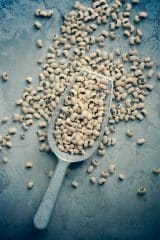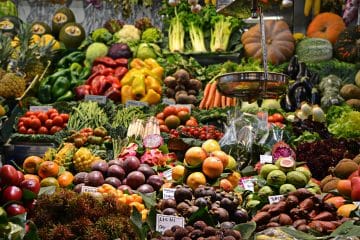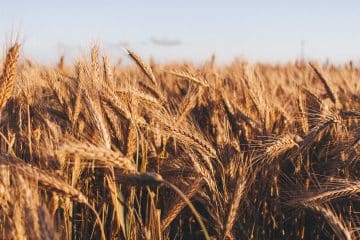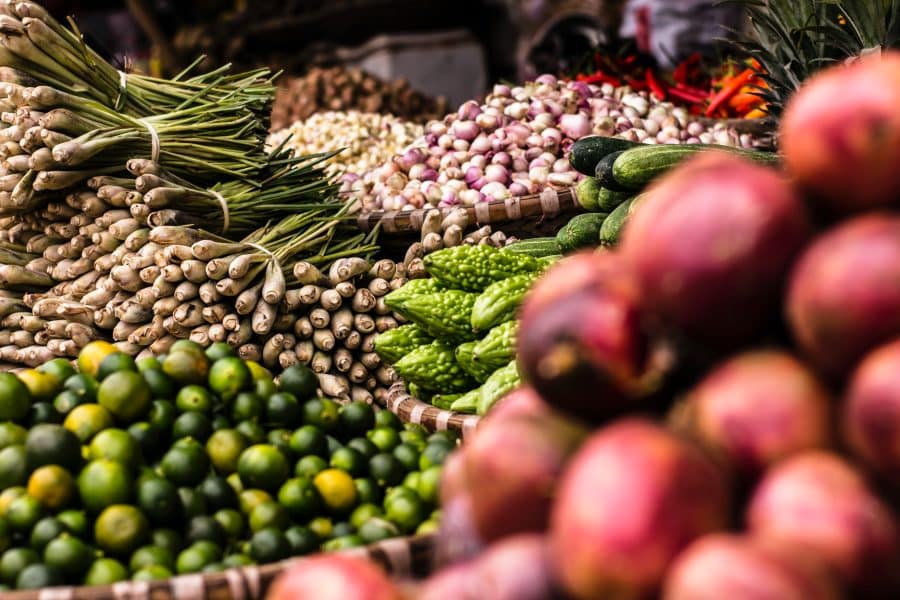Prior to the advent of the internet where most Nigerians get to seek and find information, we didn’t know that fiber foods in Nigeria was abundant. We had no idea that the foods we eat, and they help us in emptying our colon easily are rich in fiber.
Quick Facts About Fibre
Fiber foods in Nigeria have been in existence for a very long time and their benefits have been enjoyed by the elder ones. Newly adopted food choices also contain fiber but they are not as beneficial as the local fiber foods we have in Nigeria.
In this article, we will discuss about the nature of fiber, its effect in the body, and the best Nigerian fiber food options that you can choose from.
What is Fiber?
We are not referring to the synthetic material used in producing clothing material or textiles. Dietary fiber, sometimes called roughages, is the portion of food derived only from plant sources that cannot be digested by the human digestive system. It is the part of a meal or diet that is responsible for adding bulk to the total meal and helps make the consumer of such meal feel full in no time.
Dietary fiber are of two types
-
Soluble fiber
This type of fiber, as the name implies, dissolves in water. It is converted into gases and other by-products due to the action of gut bacteria in the colon through fermentation. These types of fibers are called prebiotic fibers and they are usually additives in many pre-made foods.
Examples of this fiber is found in oats, barley, sugarcane.
Soluble fiber absorbs water and become viscous, thereby delaying defecation and prolong the feeling of fullness.
-
Insoluble fiber
Insoluble fiber are not soluble in water. They are inert to the digestive enzymes in the upper part of the gastrointestinal tract. Some insoluble fiber ferment in the colon just like soluble fibers do, however, they may cause digestive disruption depending on their particle size.
Finely ground insoluble fiber may cause constipation while coarsely ground particles induce the production of mucus in the large intestine, creating bulk for the food mass.
It is important to note that dietary fiber is not absorbed by the body for any nutrient, it leaves the body with its properties asit came in. you might then wonder, why do we have to eat something that doesn’t add nutrient to our bodies?
Importance of Dietary Fiber
Dietary fiber exerts its purpose in the body through three means; bulking, fermentation, and viscosity. Some dietary fibers provide just one of the three while other provide more. Regardless, these actions result in tremendous health benefits such as:
- Improves heart health
- Eases Fecal Passage
- Prevents constipation
- Regulates blood sugar
- Alleviates constipation
Now that we know what fiber is and how important it is in the human body. it is time to know which of the foods we eat contain fiber. As we have pointed out in the beginning of this piece, we consume a lot of fiber foods in Nigeria, you might have recognized some from what we’ve discussed so far about fiber foods, the only problem is that we don’t know that’s what they are called. Therefore, let’s get to the meat of it.
Fiber Foods in Nigeria
Since fiber is gotten exclusively from fiber, we will divide this section into the different plant sources we get fiber foods in Nigeria from.
-
Legumes
- Beans
One of the fiber foods in Nigeria that has been given a bad rep because of its characteristic action in the colon. It causes the give-off of gas, let out of the body as farts, as a result of the fermentation it has undergone in the colon.
Our common beans in Nigeria has a fiber content of 13.4g per cup. This high fiber content is the reason you leave the restroom as soon as you enter the day following your beans consumption experience.

-
Soybeans
This is another good fiber food from Nigeria, even though its origin is traced to Eastern Asia. Soybean is a great source of protein and carbohydrates. It also provides the body with 6g of fiber per 100g.
It contains both soluble and insoluble fibers. The soluble fibers are fermented in the colon and helps to improve gut health through the action of the gut bacteria.
-
Fruits
-
Oranges
The juicy oranges we often suck are good sources of fiber as well as vitamin c. they also contain antioxidants and water. A combination of all these nutrients make bowel movement easy. It also contains almost no fat, making it the right fiber food in Nigeria for individuals who are watching what they eat.
The main fibers in orange are cellulose, lignin, hemicellulose, and pectin. They are most insoluble and found in the pulp.

-
Bananas
Bananas are packed with important vitamin and minerals. You would expect it to be just a super fruit that provides energy and important minerals, but it does more than that. Bananas are also rich in fiber. A medium-sized banana contains about 3.1g of fiber.
-
Pears
All forms of pear, African pear and Avocado pear, are healthy foods. African pear has numerous health benefits that you should read up on. It is rich in protein, carbohydrates and oil. It also has a fiber content of 3.45g for a medium-sized African pear. Avocado pear also has about 6g of fiber content in a medium-sized one. Pears are definitely one of the best fiber foods in Nigeria.
-
Vegetables
-
Waterleaf
Waterleaf is one of the fiber foods in Nigeria despite its moderate fiber value. Waterleaf contain just 1.0g of fiber in 100g serving. However, it is not usually eaten alone. It is usually accompanied by other fiber foods in Nigeria and its presence and high water content helps to ease bowel movement and prevent constipation.
Its fiber and water content is the reason for its recommendation to individuals who are seeking to manage or lose weight.
-
Amaranth
Amaranth is a well-known fiber food in Nigeria. It is locally called Tete among the Yorubas. It is rich and abundant in minerals such as magnesium, manganese, iron, potassium, and many more. It also contains antioxidants and fiber.
Amaranth leaves are used in cooking delicious vegetables soups in Nigeria that can be eaten without any accompaniment. It contains a fiber content of 16% of 243g.
-
Root Tubers
-
Potatoes
Potatoes are relatively high in fiber. They are ridiculously high in starch and are therefore not advisable for a diabetic’s consumption. However, their fiber content can rise dramatically after drying. In its raw state, potatoes have about 1.3g of fiber but can see a rise of 50% when it is dried as the skin is made of fiber.
It contains fiber such as pectin, hemicellulose and cellulose, which are insoluble fibers. They are useful in adding bulk to fecal matter.
-
Cassava
Cassava is also known for its high starch content. New development in cassava varieties have now produced cassava tubers that also provide the body with vitamin A. however, it will surprise you to know that cassava also has a considerable amount of fiber.
In its freshly harvested form, cassava possesses just 1g per 100g of cassava tuber. However, after processing, most of the simple sugar is lost, leaving the complex carbs behind. These complex carbs are found in garri.
They are mostly insoluble fibers and aid in adding bulk to the fecal mass.
-
Whole grains
-
Wheat
Whole wheat – wheat still bearing its bran, husk, and seed – has a very high fiber content. However, processed wheat contains almost none. Whole wheat contains up to 15% fiber content of it total dry weight but it is usually lost when the bran is removed.
Therefore, endeavour to consume whole wheat instead of processed wheat.

-
Millet
Millet is one of the best fiber foods in Nigeria. It contains about 9g of fiber in 100g serving of millet. It is a grain that is popular in the north and seldom used in the other parts of Nigeria. It is the source of nutritious local drinks like kunu.
-
Brown Rice
Brown rice is high in fiber compared to white rice. It boasts of 1.8g of fiber per 100g serving. The complex carbs are not degistible by the digestive enzymes in the upper portion of the stomach and allows them to pass.
They help to avoid constipation and lower blood glucose level.
Conclusion
Dietary fiber foods in Nigeria abound around us. We consume them everyday unaware of what healthfully beneficial foods we are eating.although Nigerian foods are known to be high in carbohydrates, they also contain high fiber content which help to control blood glucose, reduce bad cholesterol and consequently avoid cardiovascular problems.
Fiber foods are mainly plant-sourced and they contain complex carbohydrates whose glycosidic bonds can’t be broken by the human digestive enzymes. Eat more fiber foods in Nigeria and testify to the goodness it does to your health.
The content is intended to augment, not replace, information provided by your clinician. It is not intended nor implied to be a substitute for professional medical advice. Reading this information does not create or replace a doctor-patient relationship or consultation. If required, please contact your doctor or other health care provider to assist you to interpret any of this information, or in applying the information to your individual needs.

